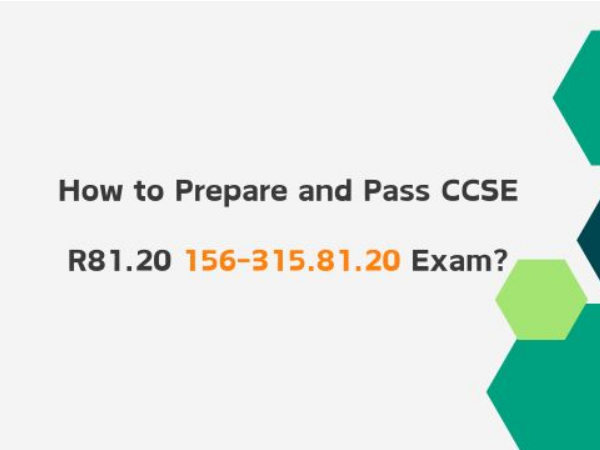Introduction
The Check Point Certified Security Expert (CCSE) R81.20 156-315.81.20 exam is designed for IT professionals who are seeking to demonstrate their extensive expertise in configuring and managing Check Point Security Gateway and Management Software Blades. This CCSE R81.20 certification is highly regarded in the industry and serves as a benchmark for those who aim to showcase their advanced skills in network security. With the recent updates and modifications made to the CCSE R81.20 156-315.81.20 exam, it has become even more crucial for candidates to be thoroughly prepared to meet the new set of challenges and requirements. Aspiring professionals must ensure that they are well-versed in the latest features and enhancements to successfully pass the exam and achieve this CCSE R81.20 certification.
156-315.81.20 Exam Overview
Duration: 90 minutes
Format: 100 multiple-choice questions, each with one correct answer.
Passing Score: 70%
The 156-315.81.20 exam focuses on various aspects of Check Point technology, including threat prevention, identity awareness, HTTPS inspection, and more. With updates from the previous CCSE R81.10, candidates must familiarize themselves with new features and concepts introduced in R81.20.
Key Updates and Focus Areas in CCSE R81.20
Custom Threat Prevention, Identity Awareness, and HTTPS Inspection:
●These topics have been moved from the CCSA to CCSE curriculum. Candidates should expect extensive lab exercises in these areas.
●Preparation Tip: Gain hands-on experience by setting up and configuring these features in a lab environment.
Code Upgrades:
●While the content still covers CPUSE, Advanced Upgrade, and migrate_server for SMS/Gateways, these are not performed in labs.
●Preparation Tip: Understand the theoretical aspects and be able to explain the processes involved.
Advanced CLI Options:
●The exam no longer covers advanced CLI options for clish and expert mode.
●Preparation Tip: Focus your studies on other areas, but still have a basic understanding of CLI commands.
External Network Feed SmartConsole Object:
●A new feature in R81.20, this object enhances threat intelligence capabilities.
●Preparation Tip: Get familiar with how to configure and use this object in SmartConsole.
Accelerated Policy Installs:
●This topic is more heavily emphasized in the R81.20 version.
●Preparation Tip: Understand the principles behind policy acceleration and how to implement it.
IoT and SSH Deep Packet Inspection:
●New features in R81.20, offering advanced security for IoT devices and SSH traffic.
●Preparation Tip: Study the configuration and deployment of these inspection features.
Domain-Based vs. Route-Based VPNs (VTIs):
●Important distinctions include IKE P1 External Certificate Authentication.
●Preparation Tip: Understand the differences, configurations, and use cases for both types of VPNs.
Hyperflow (Pipeline Paths):
●A new feature introduced in R81.20.
●Preparation Tip: Learn how Hyperflow enhances performance and how to configure it.
SmartEvent Customization:
●The exam now covers view/report customization more extensively.
●Preparation Tip: Practice creating and customizing reports in SmartEvent.
SmartConsole-Based Central Deployment Tool:
●Includes options for code upgrades and JHFA application.
●Preparation Tip: Familiarize yourself with these deployment options and their applications.
ClusterXL Advanced Deployment Options:
●Focuses on configurations like IP addresses on different subnets and cluster hide/fold.
●Preparation Tip: Study advanced ClusterXL scenarios and be able to explain different deployment strategies.
Study Resources for 156-315.81.20 Exam
Official Check Point Training: Enroll in official training courses offered by Check Point to get a comprehensive understanding of the material.
Check Point Documentation: Review the official R81.20 release notes, administration guides, and other documentation.
Lab Practice: Hands-on experience is crucial. Set up a lab environment to practice configuring and managing Check Point technologies.
Practice Exam Dumps: Take 156-315.81.20 exam dumps to familiarize yourself with the format and types of questions you might encounter.
CCSE R81.20 156-315.81.20 Exam Strategies
Time Management: With 100 questions in 90 minutes, manage your time effectively. Don’t spend too much time on any single question.
Read Questions Carefully: Ensure you understand what each question is asking before selecting your answer.
Review Key Concepts: Focus on the updated features and topics emphasized in R81.20, such as IoT inspection, Hyperflow, and SmartEvent customization.
Passing the CCSE R81.20 156-315.81.20 exam requires not only a thorough understanding of Check Point technologies but also a comprehensive grasp of the new features and enhancements introduced in this specific version. This involves a deep dive into the intricacies of Check Point's security solutions, as well as staying updated with the latest advancements and updates that have been incorporated in R81.20. Candidates must be well-versed in both foundational concepts and the new functionalities to successfully navigate and excel in this 156-315.81.20 exam.
Resource from: https://www.certqueen.com/news_How_to_Prepare_and_Pass_the_CCSE_R8120_156-3158120_Exam_2107.html
Matériaux
Outils
Étape 1 -
Published

 Français
Français English
English Deutsch
Deutsch Español
Español Italiano
Italiano Português
Português